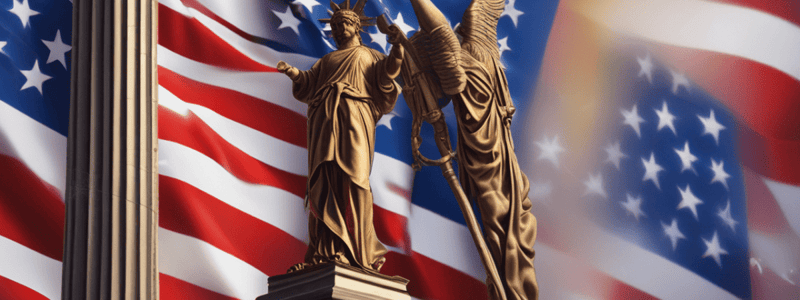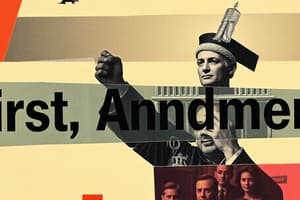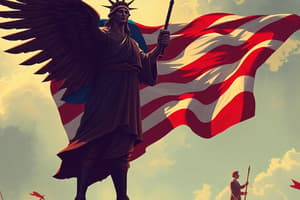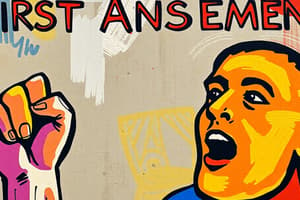Podcast
Questions and Answers
What is the key point highlighted in DeJonge v. Oregon?
What is the key point highlighted in DeJonge v. Oregon?
- Right to labor disputes
- Right to political protests
- Recognition of fundamental rights (correct)
- Right to social activities
How do courts typically view the press clause in relation to constitutional protection?
How do courts typically view the press clause in relation to constitutional protection?
- As having limited constitutional protection
- As only applicable to traditional media
- As independent from broader constitutional principles
- As part of broader constitutional protection for information dissemination (correct)
Which case is often cited as significant in protecting press freedom?
Which case is often cited as significant in protecting press freedom?
- _New York Times Co. v. Sullivan_ (correct)
- _Rosenbloom v. Metrotone Inc._
- _DeJonge v. Oregon_
- _Gideon v. Wainwright_
What is a core aspect of the freedom of petition as explained in the text?
What is a core aspect of the freedom of petition as explained in the text?
How have the fundamental freedoms mentioned been affected by various court decisions?
How have the fundamental freedoms mentioned been affected by various court decisions?
What is a critical safeguard provided by the First Amendment according to the text?
What is a critical safeguard provided by the First Amendment according to the text?
Which of the following court cases is NOT directly related to freedom of speech?
Which of the following court cases is NOT directly related to freedom of speech?
Which of the following rights is NOT explicitly mentioned in the First Amendment?
Which of the following rights is NOT explicitly mentioned in the First Amendment?
Which of the following statements about the Sherbert v. Verner case is correct?
Which of the following statements about the Sherbert v. Verner case is correct?
Which of the following rights is NOT explicitly mentioned in the text as being guaranteed by the First Amendment?
Which of the following rights is NOT explicitly mentioned in the text as being guaranteed by the First Amendment?
Which of the following statements about the Brandenburg v. Ohio case is correct?
Which of the following statements about the Brandenburg v. Ohio case is correct?
Which of the following statements is NOT true about the rights guaranteed by the First Amendment, according to the text?
Which of the following statements is NOT true about the rights guaranteed by the First Amendment, according to the text?
What is the potential consequence of ignoring a breach of neutrality in schools?
What is the potential consequence of ignoring a breach of neutrality in schools?
In the context of the text, what is the distinction made regarding the Establishment Clause requirements for standing compared to the Free Exercise Clause?
In the context of the text, what is the distinction made regarding the Establishment Clause requirements for standing compared to the Free Exercise Clause?
What is emphasized as a necessary component of education in the text regarding religion?
What is emphasized as a necessary component of education in the text regarding religion?
How does the text argue against the idea of establishing a 'religion of secularism'?
How does the text argue against the idea of establishing a 'religion of secularism'?
Based on the text, how does it argue for the value and relevance of studying the Bible in education?
Based on the text, how does it argue for the value and relevance of studying the Bible in education?
What is a key concern expressed in the text about the potential consequences of state involvement in regulating religious practices in schools?
What is a key concern expressed in the text about the potential consequences of state involvement in regulating religious practices in schools?
According to the Supreme Court's ruling in Illinois Ex Rel. McCollum v. Board of Education, which of the following practices would be considered a violation of the Establishment Clause?
According to the Supreme Court's ruling in Illinois Ex Rel. McCollum v. Board of Education, which of the following practices would be considered a violation of the Establishment Clause?
Based on the text, what is the Supreme Court's stance on the government's role in facilitating religious instruction?
Based on the text, what is the Supreme Court's stance on the government's role in facilitating religious instruction?
Which of the following scenarios would likely be considered permissible under the principles established in Illinois Ex Rel. McCollum v. Board of Education?
Which of the following scenarios would likely be considered permissible under the principles established in Illinois Ex Rel. McCollum v. Board of Education?
According to the dissenting opinion, what is the primary concern regarding the New York program?
According to the dissenting opinion, what is the primary concern regarding the New York program?
Based on the text, which of the following actions by the government would be considered unconstitutional?
Based on the text, which of the following actions by the government would be considered unconstitutional?
In the context of the Establishment Clause, what is the significance of the Supreme Court's decision in Illinois Ex Rel. McCollum v. Board of Education?
In the context of the Establishment Clause, what is the significance of the Supreme Court's decision in Illinois Ex Rel. McCollum v. Board of Education?
Based on the principles established in Illinois Ex Rel. McCollum v. Board of Education, which of the following practices would likely be considered permissible?
Based on the principles established in Illinois Ex Rel. McCollum v. Board of Education, which of the following practices would likely be considered permissible?
What principle must the government uphold regarding religious sects?
What principle must the government uphold regarding religious sects?
In the context of the Establishment Clause, how might the Supreme Court's decision in Illinois Ex Rel. McCollum v. Board of Education be interpreted regarding state neutrality towards religion?
In the context of the Establishment Clause, how might the Supreme Court's decision in Illinois Ex Rel. McCollum v. Board of Education be interpreted regarding state neutrality towards religion?
Based on the information provided, which of the following statements is true regarding parental concerns about school safety?
Based on the information provided, which of the following statements is true regarding parental concerns about school safety?
In light of the Supreme Court's ruling in Illinois Ex Rel. McCollum v. Board of Education, which of the following practices would likely be considered a violation of the Establishment Clause?
In light of the Supreme Court's ruling in Illinois Ex Rel. McCollum v. Board of Education, which of the following practices would likely be considered a violation of the Establishment Clause?
According to the dissenting opinion, how does the New York program compare to the previously invalidated Illinois system?
According to the dissenting opinion, how does the New York program compare to the previously invalidated Illinois system?
Flashcards are hidden until you start studying
Study Notes
First Amendment Law
The First Amendment of the United States Constitution guarantees several individual rights: freedom of speech, religion, assembly, press, and petition. These protections have been interpreted and expanded upon by numerous legal rulings over the years, shaping our understanding of what is considered protected under this amendment. Here's a brief overview of each right and some key cases related to them.
Freedom of Speech
Freedom of speech, enshrined in the First Amendment, means that individuals can express their thoughts without fear of government retribution. This protection extends beyond verbal communication to cover written statements and symbolic expression. Some notable court decisions upholding free speech include Whitney v. California, Brandenburg v. Ohio, and Matepenosian v. City of Portsmouth.
Freedom of Religion
Freedom of religion allows individuals to practice or not practice their faith without interference from the government. One of the most famous cases involving religious liberty is Reynolds v. United States, where the court ruled against imprisonment for teaching your children contrary to state laws. Another significant case is Sherbert v. Verner, which established that states must justify restrictive laws affecting religious exercise with a compelling interest.
Freedom of Assembly
The right to assemble peacefully is another core aspect of First Amendment freedoms. This includes gatherings for social activities, political protests, and labor disputes. A prominent example of this right being recognized is DeJonge v. Oregon.
Freedom of Press
The press clause protects any kind of publication or broadcast message. Courts often treat it as part of the broader principle that information disseminated through various mediums has the same level of constitutional protection. Key cases include New York Times Co. v. Sullivan and Rosenbloom v. Metrotone Inc..
Freedom of Petition
Citizens also have the right to ask the government to pursue certain actions or policies through petitions. While there may be limitations on when and how people can petition the government, these limitations cannot limit access to the courts themselves nor chill citizens from voicing opinions on public issues.
In conclusion, the First Amendment provides critical safeguards ensuring citizens can enjoy fundamental freedoms like those mentioned above without undue infringement from the government. These freedoms have been challenged, tested, and ultimately strengthened through various court decisions throughout history.
Studying That Suits You
Use AI to generate personalized quizzes and flashcards to suit your learning preferences.




